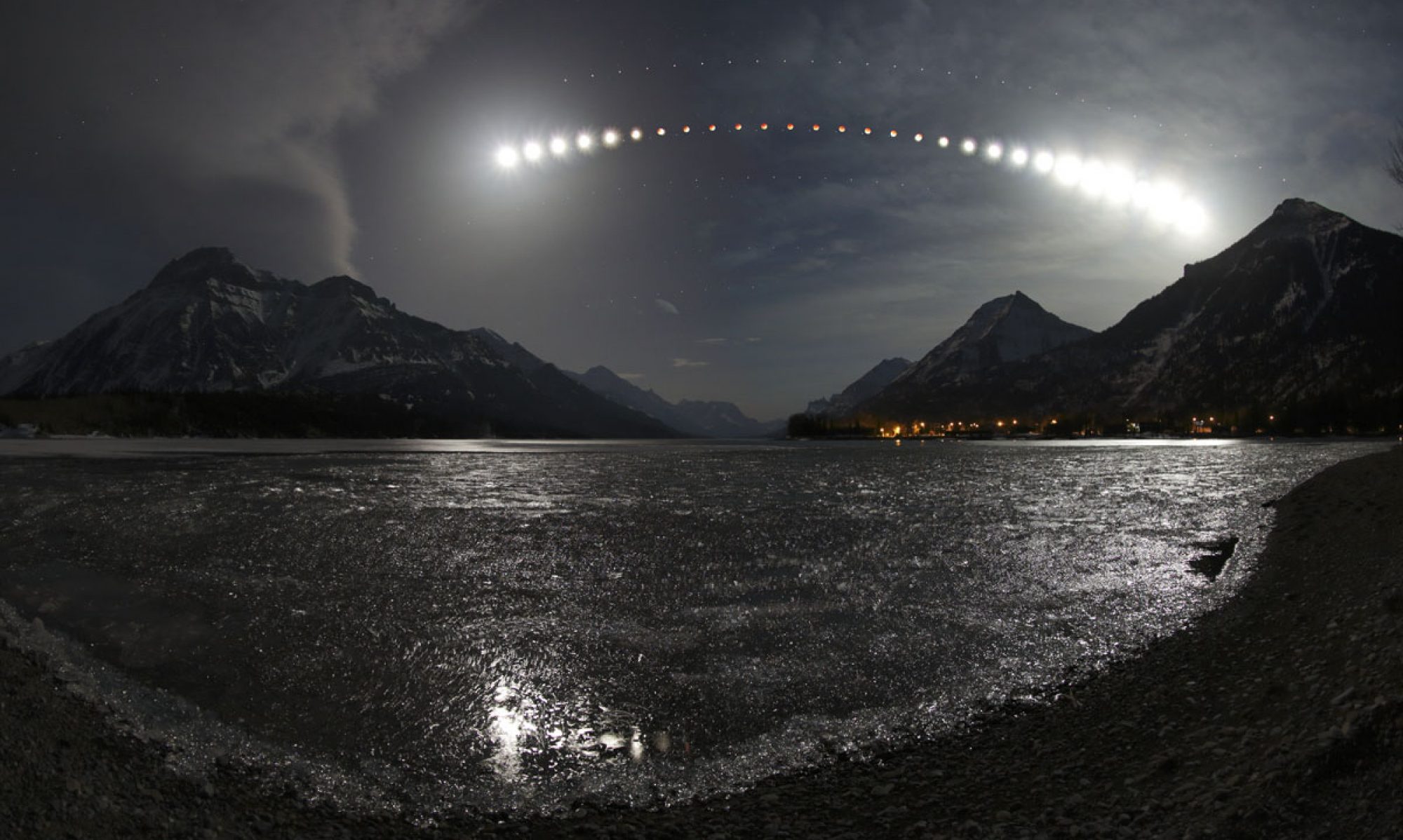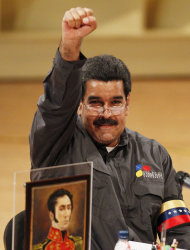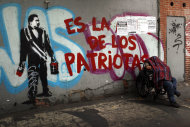Funny, the liberals adored Chavez. Just take a look at the type of oppression those liberals supported. Why would they not think to run the United States the very same way if given a chance????
http://news.yahoo.com/venezuelas-opposition-ground-down-chavistas-064738425.html
Venezuela’s opposition ground down by Chavistas
By FRANK BAJAK | Associated Press – 22 hrs ago
CARACAS, Venezuela (AP) — The people tapped by Hugo Chavez to carry on his socialist revolution seem to be improvising the rules of governing as they march toward what most Venezuelans consider certain victory in a mid-April vote to replace the late president.
Chavez’s designated successor, Nicolas Maduro, and his ruling clique have repeatedly circumvented the constitution and exploited their monopoly on power to all but crush an opposition already crippled by years of government intimidation.
The odds are so stacked against opposition candidate Henrique Capriles that he has compared his run to being “led to a slaughterhouse and dropped into a meat grinder.”
Long before Chavez succumbed to cancer, Capriles and his supporters were already maligned and harassed, legally and financially, by the government, say human rights and press freedom analysts.
Now, they say, the repression is reaching new levels as the president’s heirs step up attacks to compensate for their lack of Chavez’s political acumen, charisma and moral authority.
Liliana Ortega, director of the COFAVIC human rights group, says the government acts with “military logic: You are loyal to me to the end. One small criticism, and you’re my enemy.”
The government has vilified Capriles as a “fascist” conspiring with U.S. putschists against the homeland. It hauls opposition leaders into court on criminal corruption charges. And it has impoverished Capriles’ campaign by wielding tax investigators against donors, the opposition says,
Venezuelans learned Monday that the owners of the last remaining TV channel critical of the government were selling the channel, under what they described as government coercion. And on Wednesday, Interior Minister Nestor Reverol announced the arrest of a 53-year-old woman for sending “destabilizing” messages on Twitter. He offered few details, and the woman could not be located.
All this as the Chavista leadership choreographs Maduro’s succession, dipping into a treasury fortified by revenues from the world’s largest oil reserves and wielding a state media machine that takes control of all airwaves at will.
“It is classic consolidation of power in a crisis,” said Adam Isacson, security analyst at the Washington Office on Latin America. “There was always an effort to at least put a patina of legality on what was being done. There was always a process. There’s not much of a process now.”
Information Ministry spokesman Oscar Lloreda said he doubted there would be a comment from the government about its tactics. “I don’t think there is a spokesman interested in responding to those accusations,” he said.
The improvisation began when the Supreme Court, stacked with Chavez loyalists, said the president’s new term could begin as scheduled although he wouldn’t be sworn in on Jan. 10 as specified by the constitution. Chavez was in Cuba at the time, battling a respiratory infection after his fourth cancer surgery.
After the president’s March 5 death, Maduro was sworn in as acting leader, Chavez’s wish for the man he named vice president after defeating Capriles in October by a 12-point margin.
The constitution says the National Assembly speaker should instead become interim leader if a president-elect dies before taking the oath of office. But no matter. The high court decision saying Chavez’s term had already begun let the government swear in Maduro.
Another Supreme Court ruling, issued during Chavez’s state funeral March 8, ratified Maduro as acting president.
The opposition screamed. The government ignored them.
At the swearing-in, more improvisation. Maduro claimed the armed forces’ allegiance to a din of applause. He pumped a fist in the air as the state TV camera turned to Defense Minister Diego Molero, who reciprocated the gesture from the gallery.
A state TV channel had already announced via Twitter that the military was with Maduro, ignoring a constitutional mandate of political neutrality for the armed forces.
On Monday, another display of ruling party hubris: Maduro registered his candidacy on the terrace of the National Electoral Council, a nominally impartial body, while its chairwoman presided under a huge poster of Chavez reading “Maduro, from my heart.”
The crowd of red-shirted Chavistas was thick. Capriles didn’t show to register, sending two representatives instead.
Capriles had complained Maduro was using Chavez’s body as a political prop, and his campaign later said he was emailed that morning a photograph of a hand pointing a gun at a TV screen bearing Capriles’ image.
Chavez long ago turned the criminal justice system into a tool for exacting political vengeance, said COFAVIC’s Ortega, who for a decade has had a detail of bodyguards ordered by the Inter-American Court of Human Rights.
While Chavez could rely on his famous powers of persuasion to consolidate control, Maduro’s ruling circle lacks the panache.
“There is a blurring of constitutional mandates right now,” said Miguel Tinker Salas, a Latin American studies professor at Pomona College in California. “Maduro does not have the charisma, and the connection that Hugo Chavez had historically with the population.”
In February, authorities briefly detained the pilots of a loaned private plane that had brought Capriles back from a family visit to New York, with officials searching the plane up and down, people close to the candidate said on condition of anonymity due to the matter’s sensitivity.
And no sooner had Capriles announced his candidacy Sunday than Maduro was on the air, accusing him of seeking to provoke violence and suggesting he could face criminal charges for insulting Chavez’s family.
Capriles accused the government of repeatedly lying to create false hopes that Chavez would recover and bolster its own political ambitions. He even suggested it may have lied about the timing of Chavez’s death.
The government has in recent years forced dozens of critics into exile but the opposition only identifies a handful of people as “political prisoners.”
One is a judge, Maria Lourdes Afiuni, whose freeing of a banker jailed for alleged currency violations enraged Chavez in 2009. He had her thrown in jail and she remains under house arrest. The U.N. calls her a political prisoner.
Capriles aide Leopoldo Lopez, who faces government charges of influence peddling in a 15-year-old case, calls the strategy pinpoint persecution, a “selective strangling” of the leadership.
Although Venezuela’s high inflation, food shortages and rampant crime provide ample ammunition for criticizing the leadership, a hard political reality is that the opposition can’t match the enormous resources the government wields to win over voters, including a flurry of state TV channels that deluge the public with hours of fawning video of Maduro handing out free government housing and praying for the late leader.
Capriles’ campaign, meanwhile, is nearly destitute, carrying nearly $1 million in debt from the last campaign, said his campaign finance director, Rafael Guzman.
Although Venezuelan law allows businesses and individuals to freely make political contributions of any amount, the Chavista government persecutes people who donate to opposition candidates as if they were breaking the law, Guzman said.
“Here in Venezuela, it is basically a crime to do opposition politics,” he said.
If big companies contribute, tax authorities immediately jump on them and begin auditing for accounting irregularities, he said. “So we don’t even go to big companies,” he said.
One company that wasn’t afraid was Globovision, the last TV channel standing that’s been critical of the government.
On Monday, owner Guillermo Zuloaga told employees he had sold it to a businessman apparently friendly with the government.
“We have been harassed by the state’s institutions, in a completely polarized country, opposing an all-powerful government that wants to see us fail,” Zuloaga wrote.
The sale is to go through immediately after Venezuelans cast their ballots for a new president April 14.
Globovision’s journalists are hurt, but hard-bitten.
Delvalle Canelon, host of the Sunday show “Hello, Venezuela,” recalled constant physical and legal harassment that got so bad Globovision took to routinely sending journalists into pro-Chavez zones with helmets and flak jackets.
Information scarcity has been another issue.
“We haven’t had access to government sources in years.”
___
Associated Press writers Jack Chang, E. Eduardo Castillo, Fabiola Sanchez and Christopher Toothaker contributed to this report.

 View Photo
View Photo